This post may contain affiliate links. Please read our policy page.
I’ve discovered 20 innovative storage solutions for libraries that utilize organic cotton‘s eco-friendly charm. From stylish organic cotton book bags for easy transport to versatile modular shelving units, each option promotes sustainability without sacrificing functionality. Reusable tote bags and folding storage bins add convenience for events and everyday use. Plus, personalized labels and protective covers enhance organization and preservation. Curious about how these creative solutions can transform library spaces? There’s more to explore!
Organic Cotton Book Bags for Easy Transport
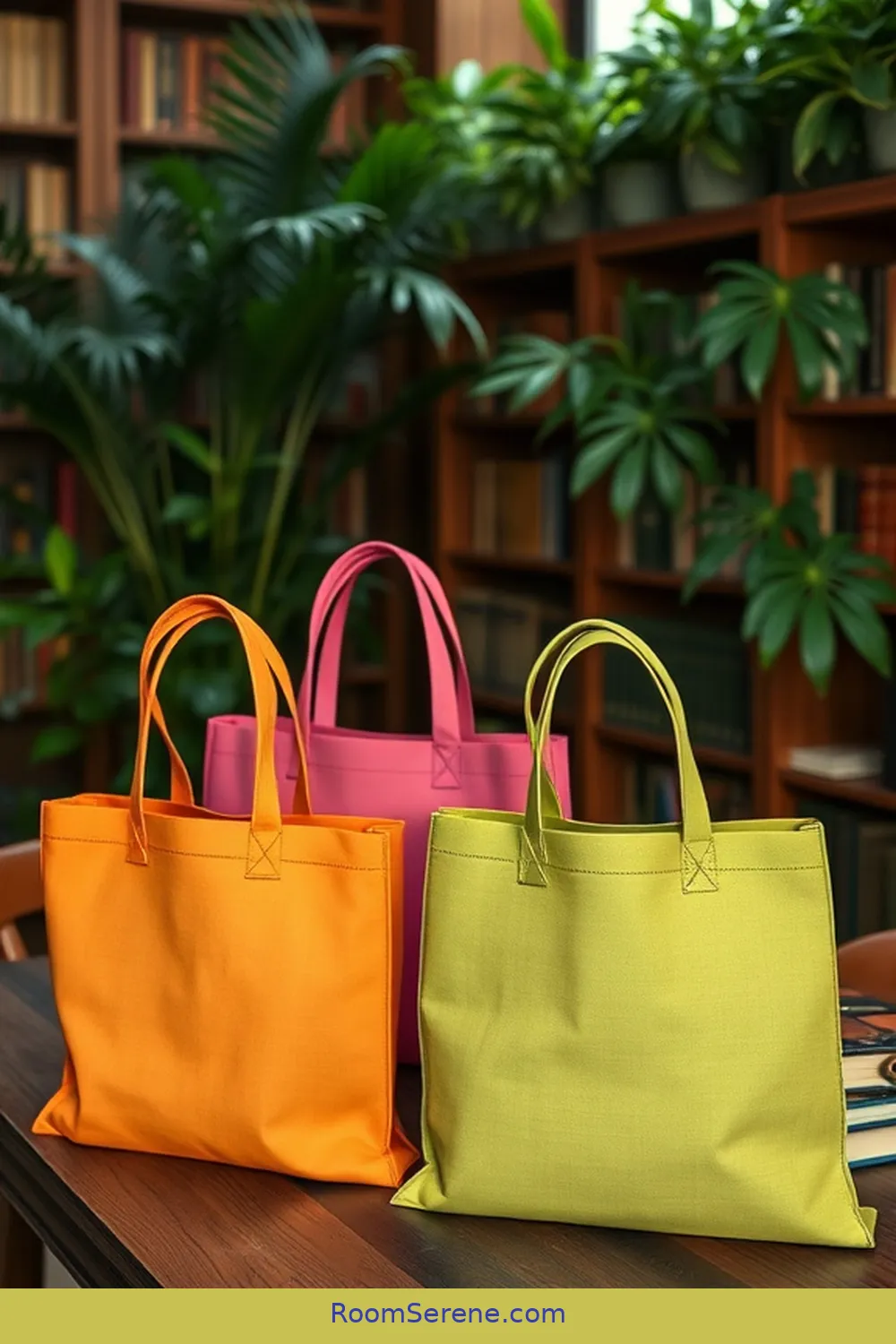
When I think about the convenience of transporting books, organic cotton book bags instantly come to mind.
Organic cotton book bags offer a stylish and eco-friendly way to transport your favorite reads with ease.
These bags aren’t just practical; they’re a stylish solution for every book lover. With their sturdy, breathable fabric, they cradle my favorite novels and reference materials without fear of damage.
I love how the long handles fit comfortably over my shoulder, allowing me to carry multiple books without straining my hands. Plus, the eco-friendly aspect makes me feel good about my choice, knowing I’m reducing plastic waste.
Whether I’m heading to the library or a cozy café, these bags make it easy to grab and go. They truly blend functionality and sustainability, making each trip to grab a book an enjoyable experience.
Modular Organic Cotton Shelving Units
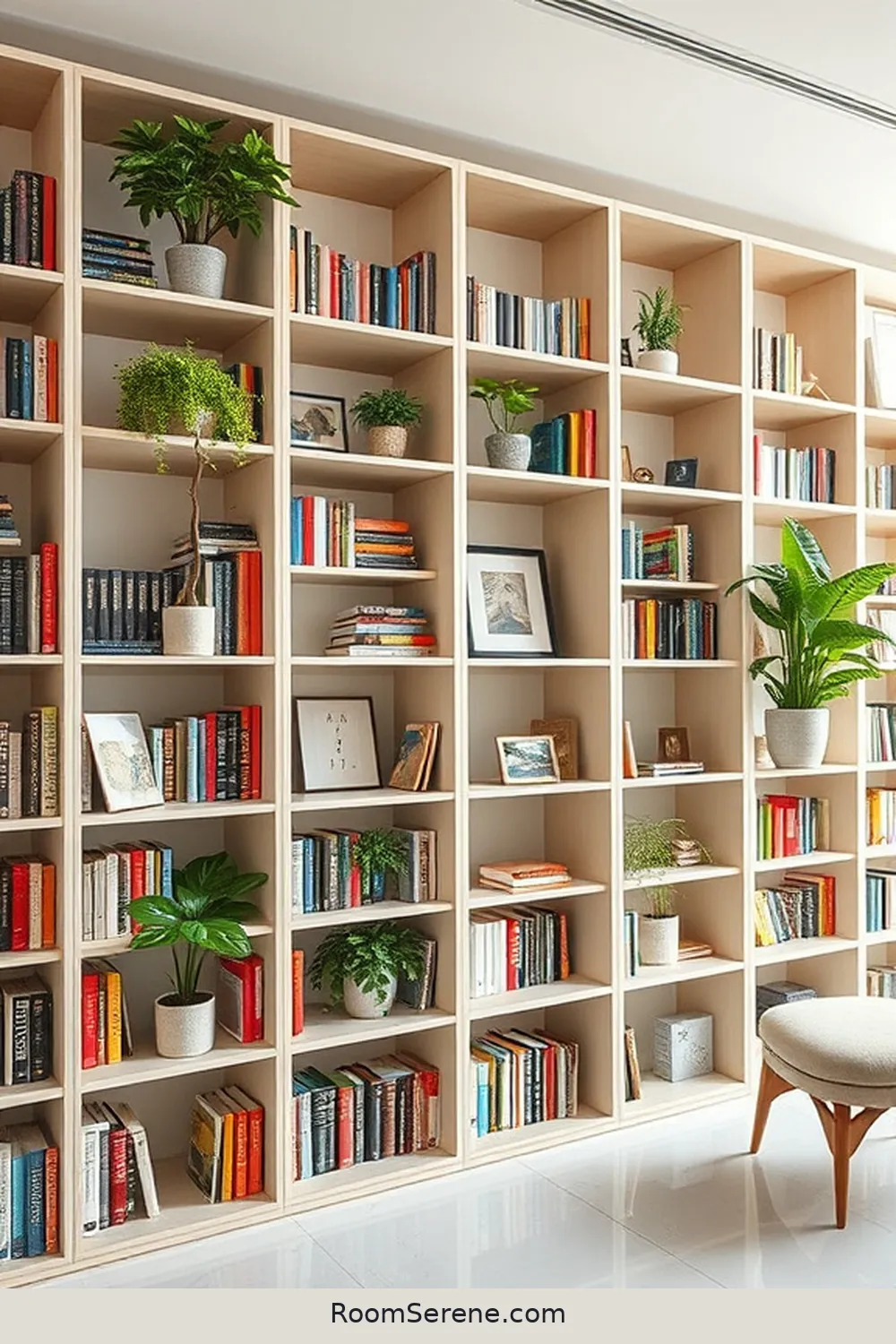
While browsing through innovative storage options, I stumbled upon modular organic cotton shelving units that completely transformed my bookshelf game.
These units aren’t only eco-friendly but also incredibly versatile. Each shelf can be adjusted, allowing me to create a customized layout that fits my space and needs perfectly.
The soft texture of the organic cotton adds a warm touch, making my library feel inviting. I love how lightweight they are; rearranging them when I get new books is a breeze!
Plus, the vibrant colors available let me express my personality while keeping everything organized. If you’re looking for a stylish and sustainable solution to display your collection, these modular units are a game-changer you won’t want to miss!
Reusable Organic Cotton Tote Bags for Library Events
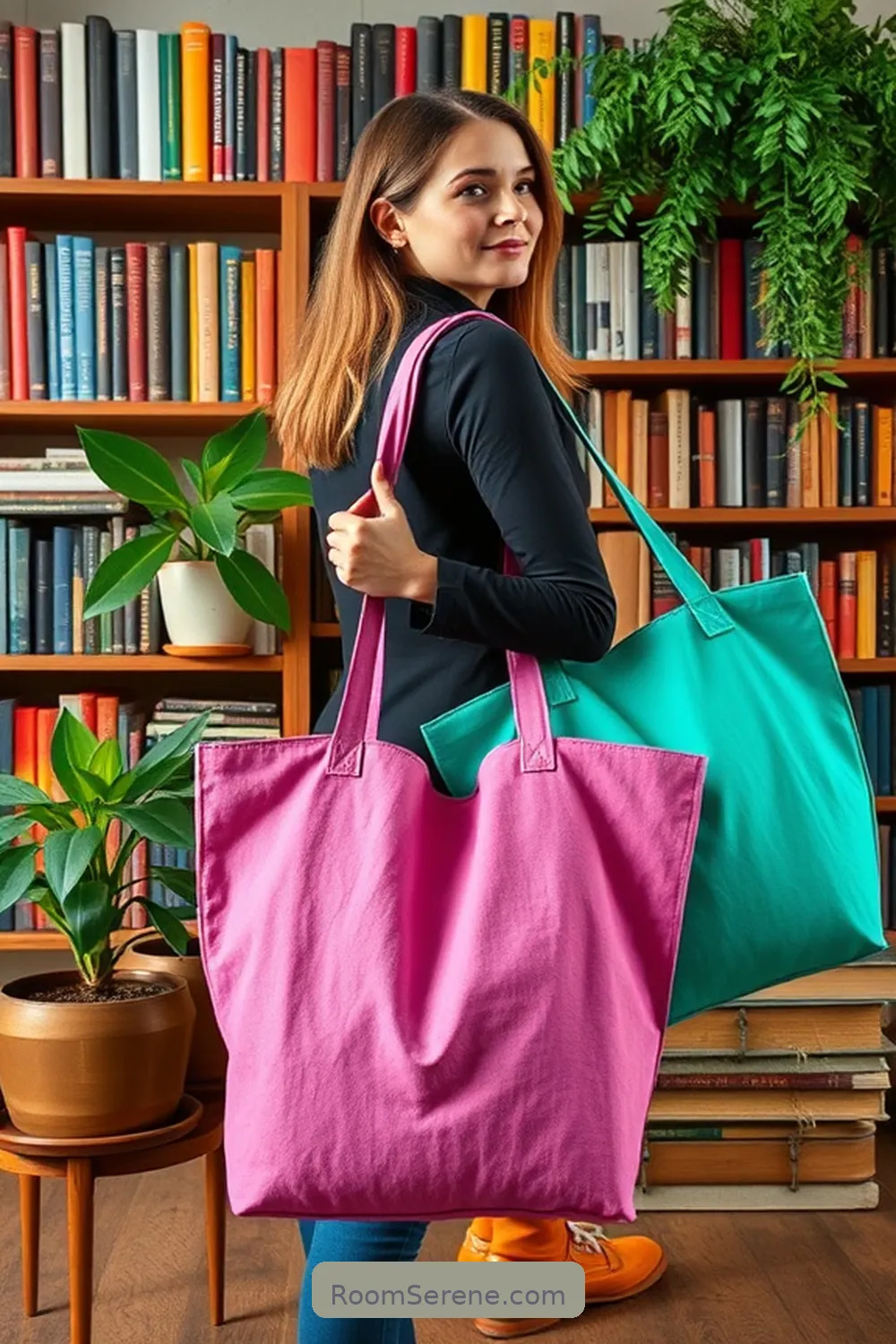
As I prepared for our library’s annual book fair, I realized how essential reusable organic cotton tote bags are for making the event both eco-friendly and stylish. Not only do these bags reduce plastic waste, but they also provide a perfect canvas for showcasing our library’s branding.
I chose bags in vibrant colors that reflect our community’s spirit, making them appealing to all ages. Each tote’s spacious design easily accommodates multiple books and promotional materials, encouraging attendees to load up on their favorites.
Plus, their sturdy construction means they’ll be used long after the fair ends—think grocery shopping or beach days! By offering these bags, we’re promoting sustainability while enhancing the overall experience for our visitors.
Folding Organic Cotton Storage Bins

After our successful book fair and the excitement generated by the reusable organic cotton tote bags, I started thinking about other innovative ways to enhance our library’s organization and aesthetic.
That’s when I discovered folding organic cotton storage bins. These bins aren’t just functional; they add a touch of charm to our space. With their vibrant colors and patterns, they invite both kids and adults to explore.
I love how they can be easily collapsed when not in use, saving precious space. Plus, being made from organic cotton means they’re eco-friendly, aligning perfectly with our library’s values.
Easily collapsible and eco-friendly, these organic cotton storage bins beautifully align with our library’s values while saving space.
I’ve started using them to organize everything from craft supplies to seasonal decorations, and they’ve transformed our clutter into a visually appealing display.
Organic Cotton Book Covers for Protection

Discovering organic cotton book covers felt like a revelation, especially since they provide the perfect blend of protection and style for our beloved library books.
These covers embrace each book with a softness that not only shields against dust and wear but also adds a touch of elegance to our shelves. I love how the natural fibers breathe, preventing moisture buildup while allowing the book’s beauty to shine through.
Plus, they’re easy to clean—just a gentle wipe, and they’re good as new! With various colors and patterns available, I can match them to our library’s aesthetic while promoting sustainability.
It’s a win-win situation—protecting our books and the environment at the same time!
Customizable Organic Cotton Organizers
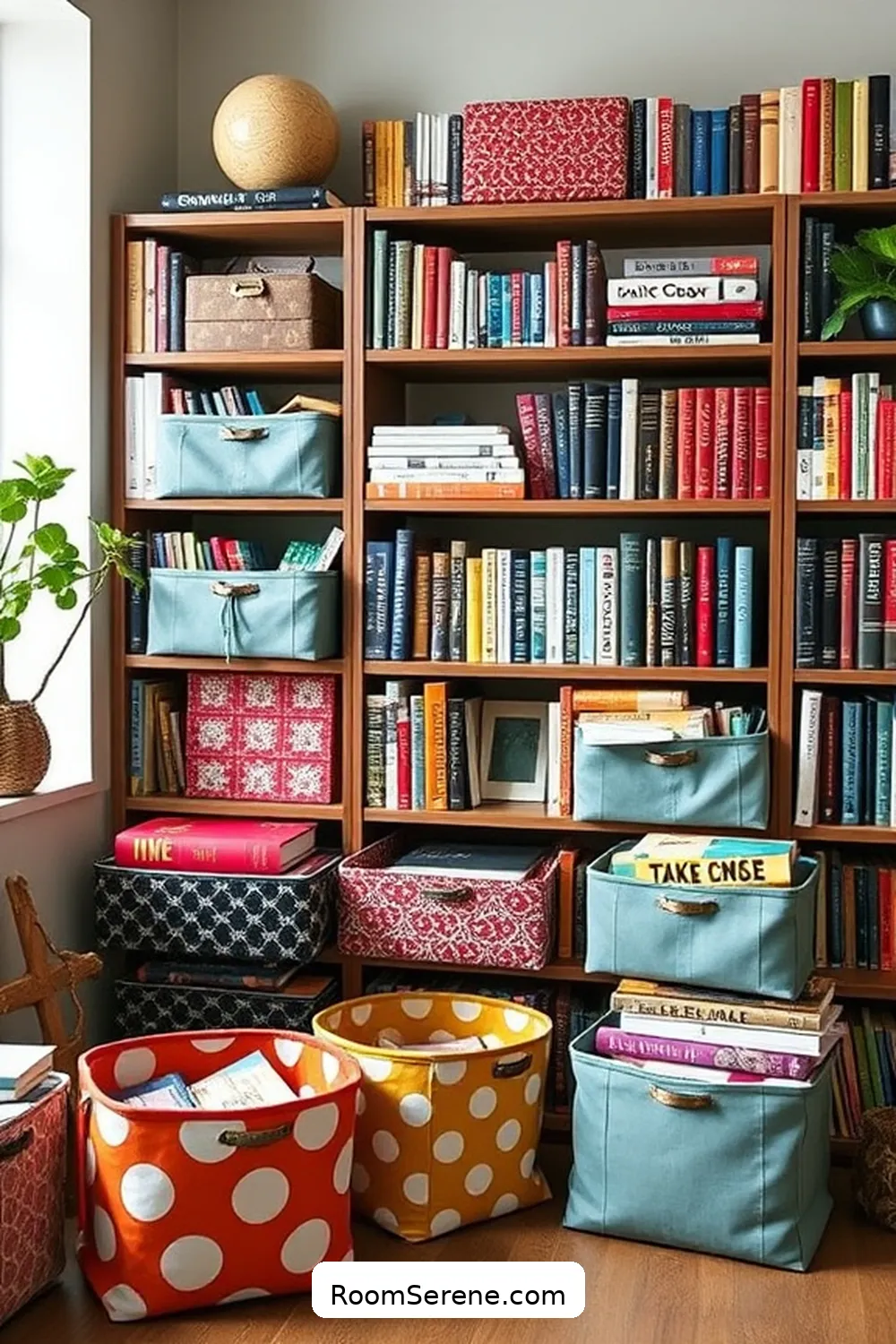
Building on the charm of organic cotton book covers, I soon found myself enchanted by customizable organic cotton organizers. These organizers not only add a touch of elegance but also serve as practical tools to declutter any space. Imagine choosing colors and patterns that speak to your library’s personality while keeping everything tidy.
| Size | Color | Pattern |
|---|---|---|
| Small | Forest Green | Geometric |
| Medium | Sky Blue | Floral |
| Large | Earth Brown | Stripes |
| Extra-Large | Soft Pink | Polka Dots |
| Custom | Any | Your Design |
With customizable options, you can create a storage solution that’s uniquely yours, promoting a functional yet artistic library environment.
Organic Cotton Wall Pockets for Small Items

There’s something truly delightful about incorporating organic cotton wall pockets into your library’s design. They’re not just functional; they add a touch of warmth and charm to any space.
I love how these pockets can hold everything from bookmarks and pens to small notebooks and reading glasses, ensuring that essential items are always within reach. The soft texture of organic cotton complements the inviting atmosphere of a library, making it feel more welcoming.
Plus, they’re eco-friendly, so you can feel good about your choices. Hanging them on walls or behind doors frees up precious desk space, transforming clutter into organized beauty.
Trust me, once you try these wall pockets, you’ll wonder how you ever managed without them!
Eco-Friendly Organic Cotton Drawer Dividers
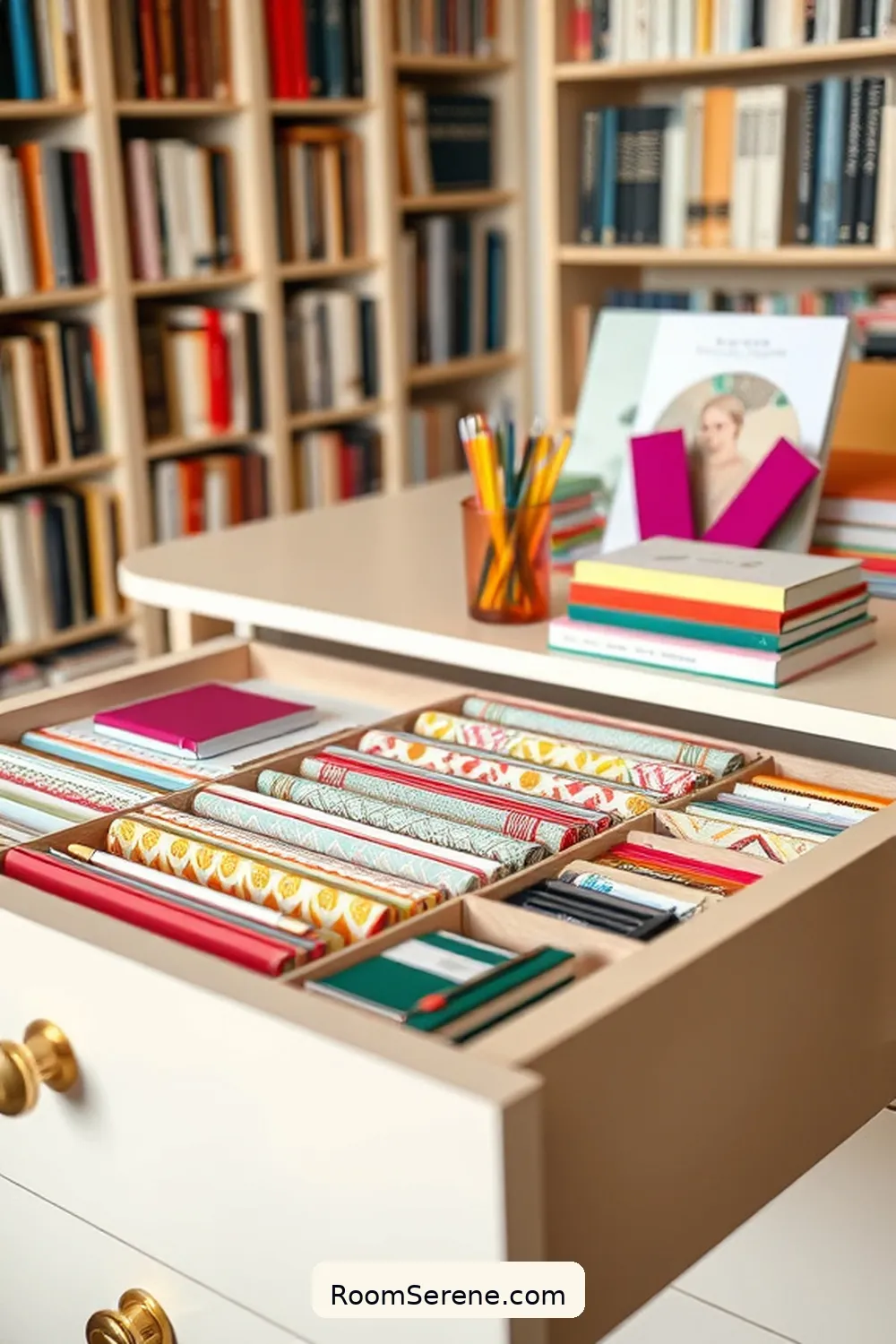
Organizing a library isn’t just about shelving books; it’s also about creating a functional and inspiring space for patrons.
One of my favorite solutions has been using eco-friendly organic cotton drawer dividers. They not only keep smaller items neatly organized, but they also contribute to a sustainable environment.
Here’s why I love them:
- Versatility: Perfect for sorting bookmarks, stationery, or even small tech gadgets.
- Breathability: Organic cotton materials allow for airflow, keeping items fresh.
- Aesthetic Appeal: These dividers come in lovely natural colors that enhance the library’s look.
- Easy to Clean: A quick wipe is all they need to stay looking great.
Incorporating these dividers has transformed our organization, making it easier for everyone to find what they need!
Recommended Items
Discover our curated selection of products and equipment to enhance your library’s storage solutions—let’s dive in!
Products
Portable Organic Cotton Carts for Mobile Libraries

When you think about enhancing the mobility of library resources, portable organic cotton carts come to mind as a game-changer. These carts aren’t just functional; they’re also eco-friendly and stylish. Imagine easily moving books, supplies, or even hosting pop-up reading events in your community! The durability of organic cotton guarantees that these carts can handle the weight while looking good.
| Feature | Benefits |
|---|---|
| Lightweight Design | Easy to transport |
| Eco-Friendly Material | Sustainable and stylish |
| Versatile Usage | Perfect for events, storage, or displays |
Stackable Organic Cotton Storage Cubes

While I explore new ways to enhance library organization, stackable organic cotton storage cubes stand out as a versatile solution.
These cubes not only add a touch of eco-friendliness but also offer practical benefits. Here’s why I love them:
These stackable organic cotton storage cubes blend eco-friendliness with practicality, making them a perfect addition to any library.
- Space-Saving Design: Their stackable nature maximizes vertical space, perfect for smaller areas.
- Durability: Made from organic cotton, they’re sturdy and built to last, even with frequent use.
- Aesthetic Appeal: Available in various colors and patterns, they can match any library decor.
- Easy Accessibility: Lightweight and easy to move, I can rearrange them as needed without hassle.
With these cubes, my library feels more organized and inviting, making it a joy for patrons to explore.
Task Overview: Creative Library Storage Ideas
Organic Cotton Bookends for a Stylish Look

Bookends can transform a simple bookshelf into a stylish showcase, and organic cotton bookends are a fantastic choice for any library.
I love how these bookends blend functionality with eco-friendliness, offering a soft yet sturdy support for my favorite reads. The natural fibers create a warm, inviting atmosphere, and they come in a variety of colors and patterns that suit any aesthetic.
I’ve found that their lightweight design makes rearranging my books a breeze, while the unique textures add a touch of character. Plus, knowing they’re made from organic materials gives me peace of mind.
When I walk into my library, those chic bookends not only keep my books organized but also elevate the overall look of the space.
Hanging Organic Cotton Storage Solutions

As I explored ways to maximize my library’s space, I discovered the charm of hanging organic cotton storage solutions. These versatile organizers not only save floor space but also add a touch of warmth to the room.
Here are a few benefits I found:
- Easy access: I love that I can quickly grab what I need without rummaging through piles.
- Customizable: With various sizes and colors, I can create a cohesive look that matches my library’s theme.
- Eco-friendly: Made from organic materials, these storage solutions align with my commitment to sustainability.
- Lightweight: They’re easy to install and reposition, allowing me to adapt my library’s layout effortlessly.
Hanging organic cotton storage has truly transformed my space!
Organic Cotton Craft Supply Organizers
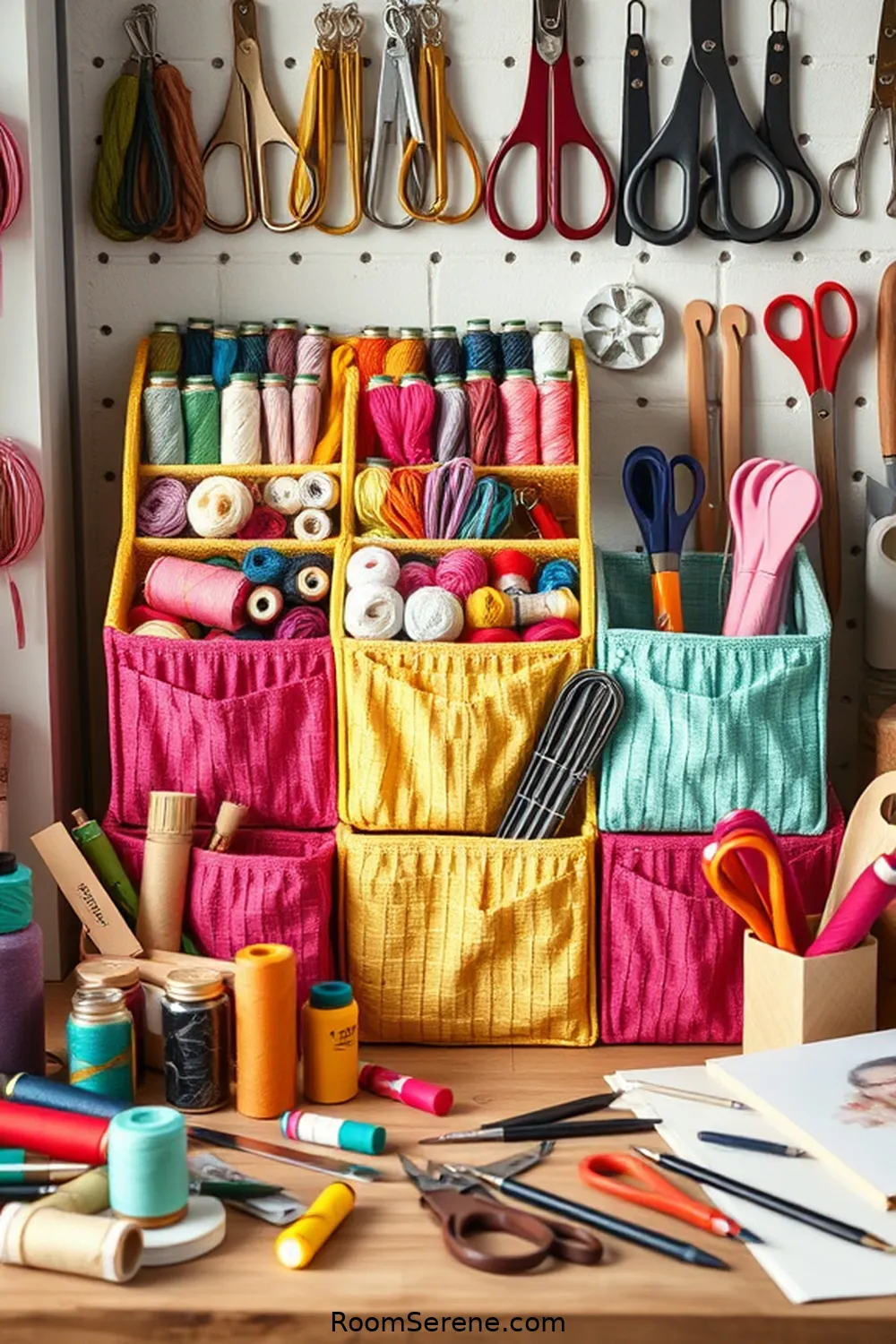
Discovering organic cotton craft supply organizers has been a game-changer for my creative space.
These eco-friendly organizers not only look great but also keep my supplies neatly arranged and easily accessible. I love how the soft cotton fabric comes in various colors and patterns, adding a touch of personality to my workspace.
Whether it’s paintbrushes, yarn, or scrapbooking materials, each item now has its designated spot, reducing clutter and enhancing my creativity.
I appreciate the durability of the cotton, which withstands daily use without losing its charm. Plus, they’re lightweight, making it easy to rearrange my setup as I experiment with new projects.
If you’re a fellow crafter, I highly recommend giving these organizers a try!
Multi-Purpose Organic Cotton Carryalls
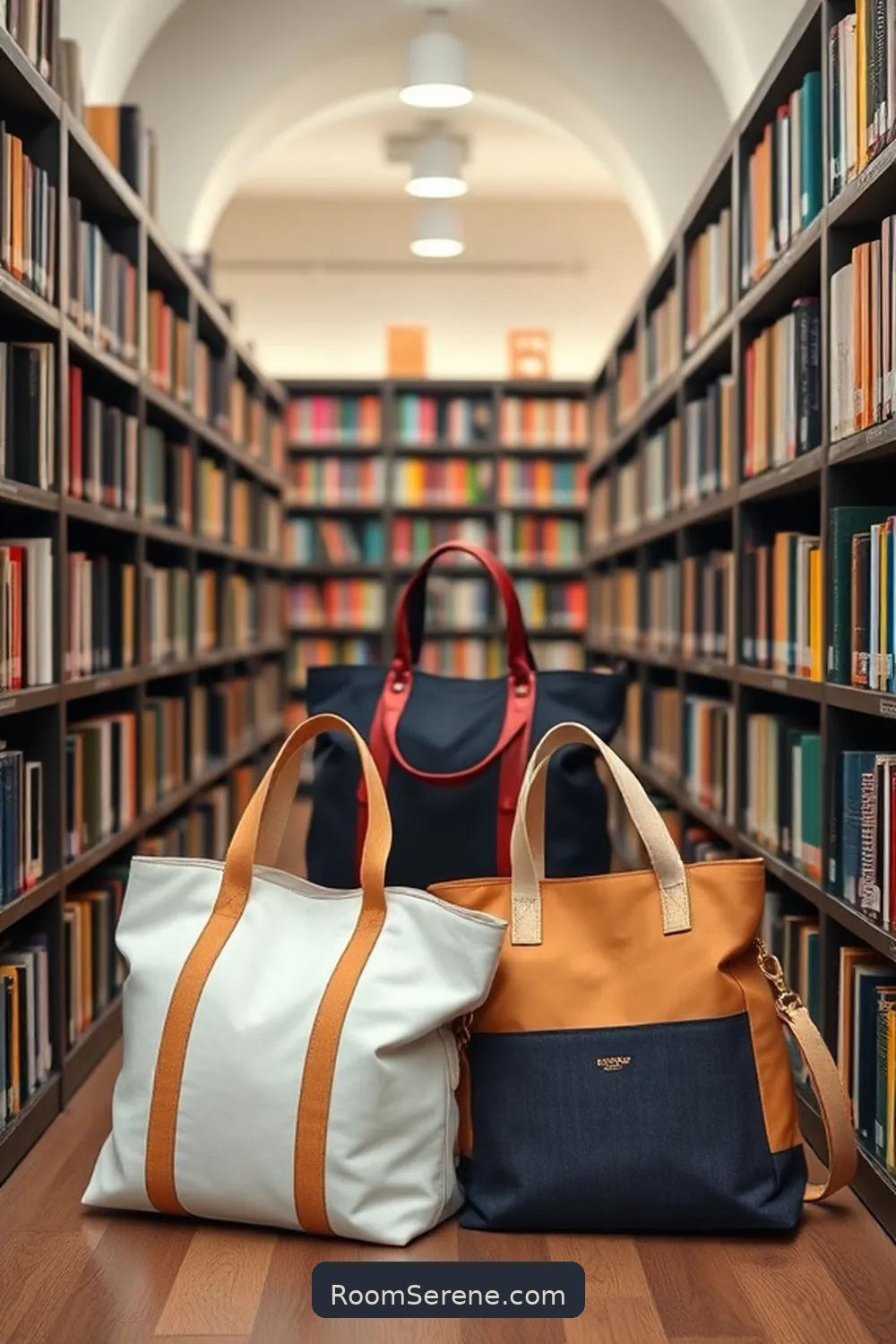
When I first stumbled upon multi-purpose organic cotton carryalls, I knew I’d found a versatile solution for my daily needs.
Discovering multi-purpose organic cotton carryalls has been a game-changer for my everyday essentials.
These stylish bags aren’t just for show; they’re incredibly functional. Here’s what I love about them:
- Library Trips: Perfect for carrying books, ensuring they stay safe and organized.
- Craft Supplies: Ideal for holding all my crafting materials, making it easy to transport projects.
- Picnic Essentials: They’re roomy enough to pack snacks and drinks for a lovely outdoor gathering.
- Grocery Run: I use them for quick grocery trips, reducing my reliance on plastic bags.
With their eco-friendly nature and practicality, these carryalls have truly transformed my storage game!
Organic Cotton Magazine Holders
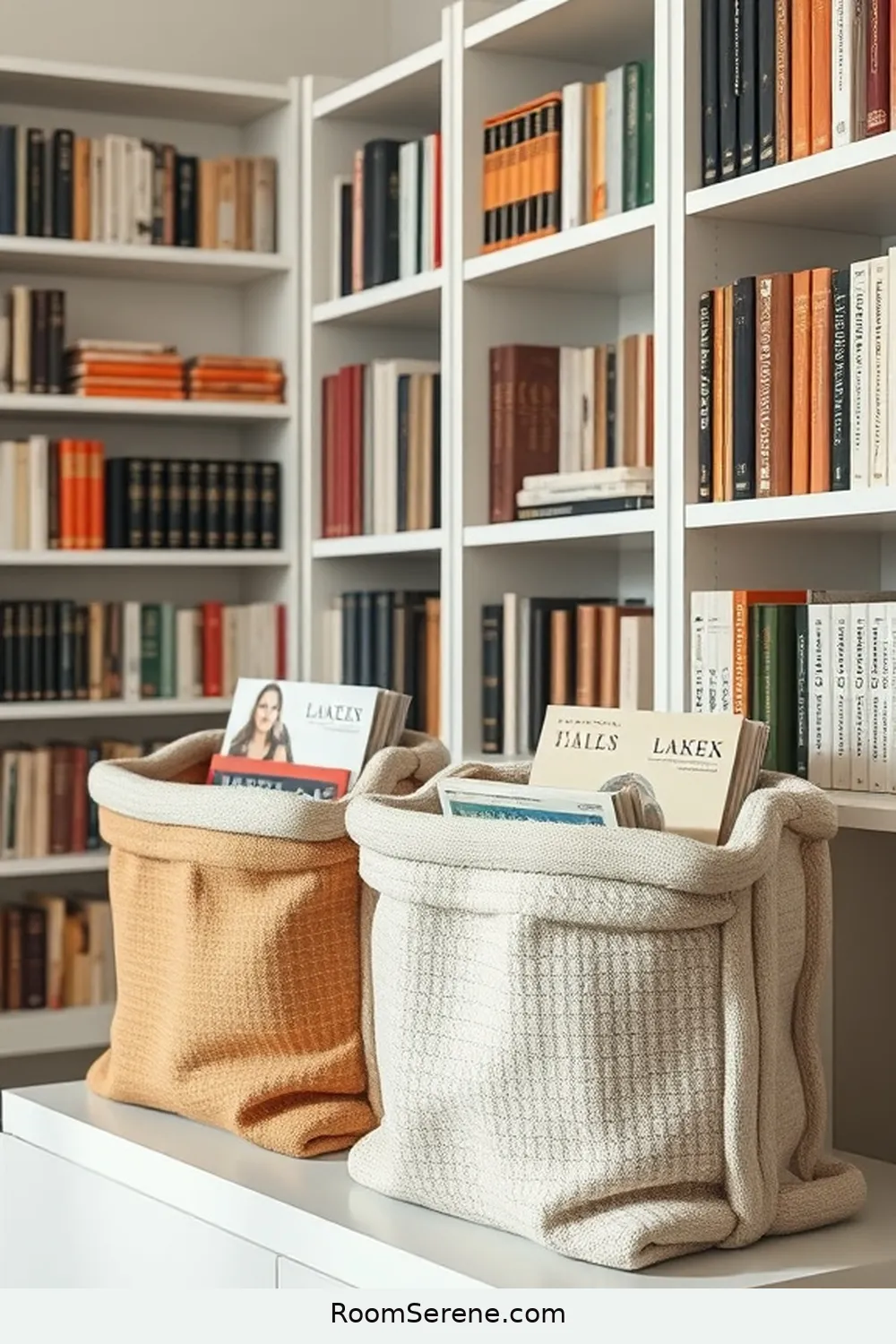
After embracing the versatility of multi-purpose organic cotton carryalls, I found my storage needs expanding into another domain: magazine holders.
These holders are a game-changer for keeping my favorite reads organized and accessible. The soft, durable fabric not only adds a touch of warmth to my library, but it also allows for easy cleaning and maintenance.
I love how they come in various sizes and colors, making it simple to match my decor. With a thoughtful design that keeps magazines upright, I never have to worry about dog-eared pages again.
Plus, knowing they’re made from organic cotton gives me peace of mind, contributing to a more sustainable environment. These holders are functional, stylish, and a must-have for any avid reader.
Sustainable Organic Cotton Waste Bins

The elegance of sustainable organic cotton waste bins has transformed my approach to tidiness in the library.
These bins not only enhance the aesthetic but also reflect a commitment to eco-friendliness. Here’s why I love them:
- Durability: Made from organic cotton, they withstand daily use without wear and tear.
- Versatility: They fit seamlessly into any corner or theme, blending in beautifully with bookshelves and study areas.
- Sustainability: Choosing these bins means supporting eco-conscious practices that benefit our planet.
- Easy Maintenance: A simple wipe-down keeps them looking fresh, making cleanup a breeze.
Incorporating these bins has made it easier for everyone to keep the library clean and inviting while embracing sustainable choices.
Eco-Conscious Organic Cotton Display Stands

Organic cotton display stands have become a game changer in how I showcase materials in the library. These stands not only highlight our collection beautifully but also reflect my commitment to sustainability.
Each stand, crafted from organic cotton, brings a soft, inviting texture that enhances the overall aesthetic of our reading spaces. I love how lightweight and portable they are, allowing me to rearrange displays effortlessly for special events or seasonal themes.
Crafted from organic cotton, these lightweight stands enhance our reading spaces with a soft texture, making display rearrangements effortless.
Plus, the eco-friendly nature of the material resonates with our community’s values, sparking conversations about sustainability. I’ve noticed patrons gravitating toward these stands, captivated by their design and the stories they tell.
It feels rewarding to combine functionality with environmental consciousness in every display I create.
Organic Cotton Resource Wraps for Easy Access
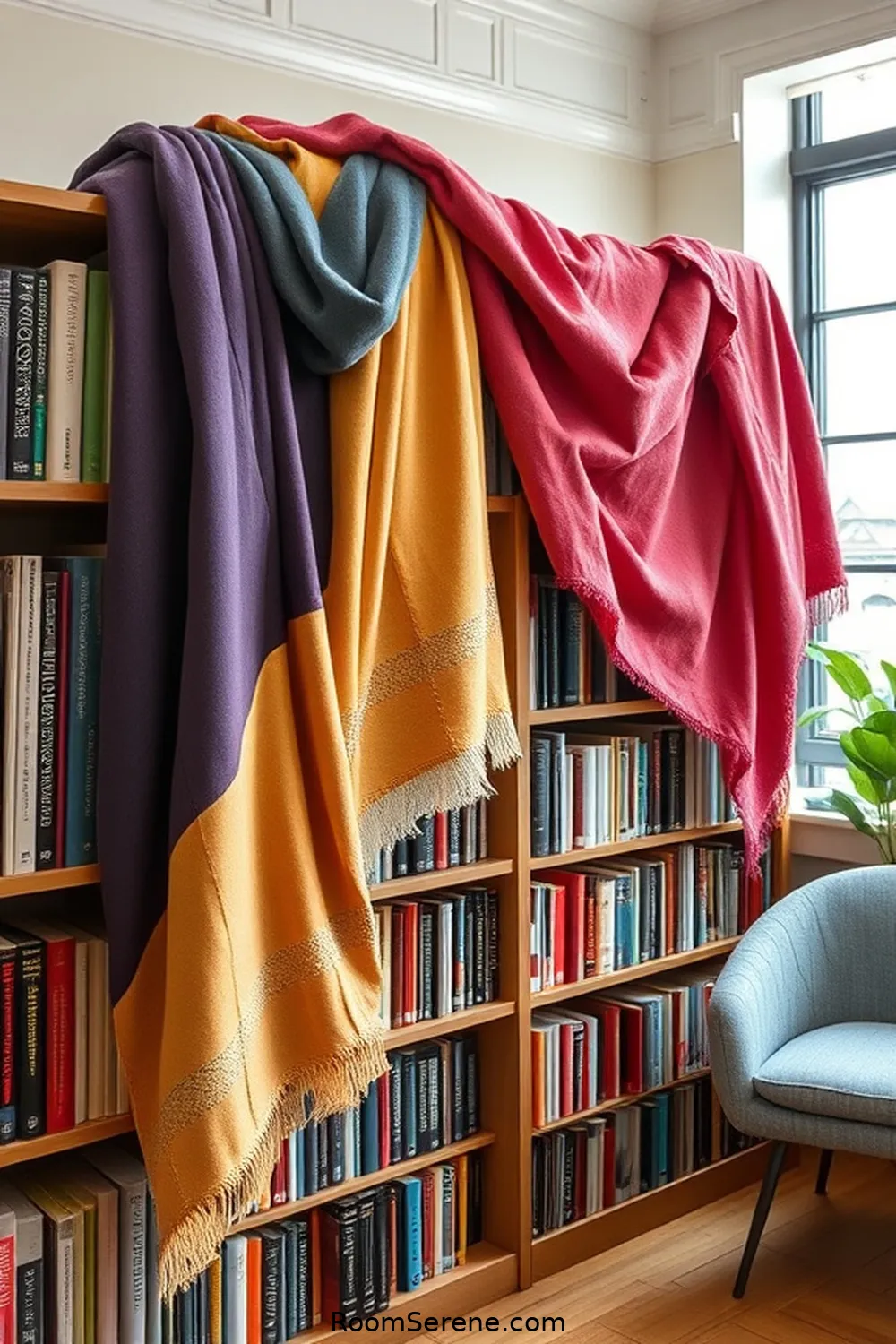
Five resource wraps made from organic cotton have transformed the way I organize and present materials in the library.
These wraps not only provide a chic, eco-friendly touch, but they also enhance accessibility. Here’s how they’ve revolutionized my approach:
- Versatility: I can wrap anything from books to pamphlets, allowing me to showcase diverse materials effortlessly.
- Easy Identification: The soft texture makes it simple to grab and go, reducing the time spent searching for resources.
- Eco-Friendly: Using organic cotton aligns with my commitment to sustainability, making me feel good about my choices.
- Aesthetic Appeal: Their natural look adds a warm, inviting vibe to my library space, attracting more visitors.
These wraps have truly made a difference!
Personalized Organic Cotton Labels for Organization

Personalized labels made from organic cotton have become my secret weapon for maintaining order in the library. They not only add a touch of charm but also serve a practical purpose.
I love how I can customize each label with vibrant colors and unique fonts that reflect the contents of the shelves. These labels stick securely and are washable, making them perfect for high-traffic areas.
When I organize my books, I feel a sense of accomplishment seeing everything clearly labeled—fiction, non-fiction, reference, and more. It’s satisfying to know that library users can easily find what they need.
Plus, the eco-friendly aspect of organic cotton aligns with my commitment to sustainability. These labels truly transform chaos into an organized haven!
Organic Cotton Furniture Covers for Preservation

After organizing my library with those charming organic cotton labels, I realized that protecting the furniture is just as important for maintaining a welcoming atmosphere.
Organic cotton furniture covers have become my go-to solution, blending style with functionality. Here’s why you might love them too:
Organic cotton furniture covers are my favorite blend of style and functionality for a cozy, inviting space.
- Eco-Friendly: Made from sustainable materials, they’re a win for the planet.
- Breathable: Unlike synthetic fabrics, organic cotton allows air circulation, preventing moisture buildup.
- Customizable: I can find or create covers that match my library’s aesthetic perfectly.
- Durable: They resist wear and tear, ensuring my furniture stays pristine for years.
With these covers, my library not only looks good but feels inviting, making it a true haven for readers.









